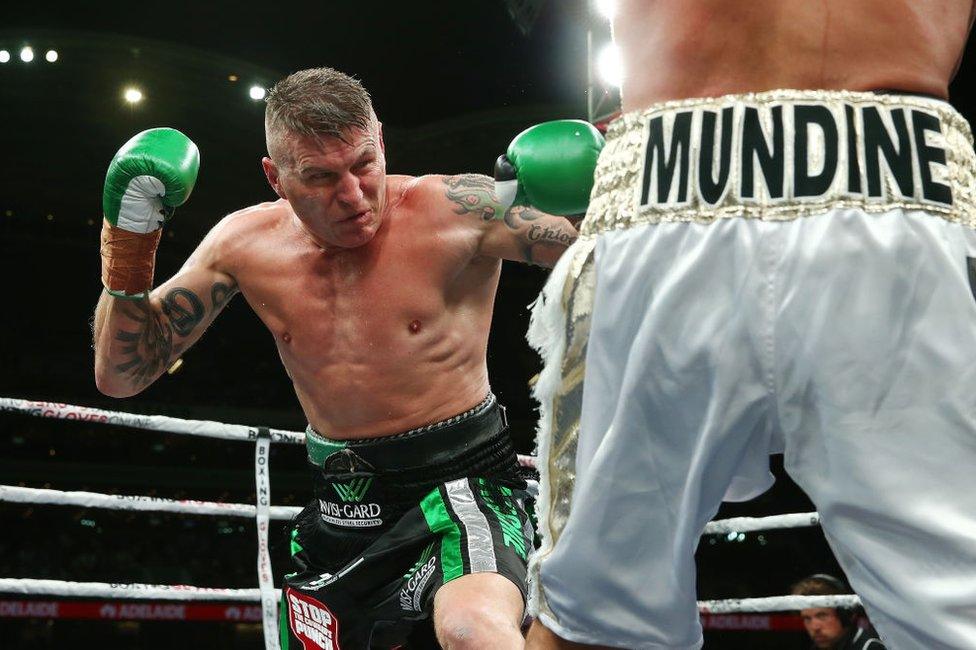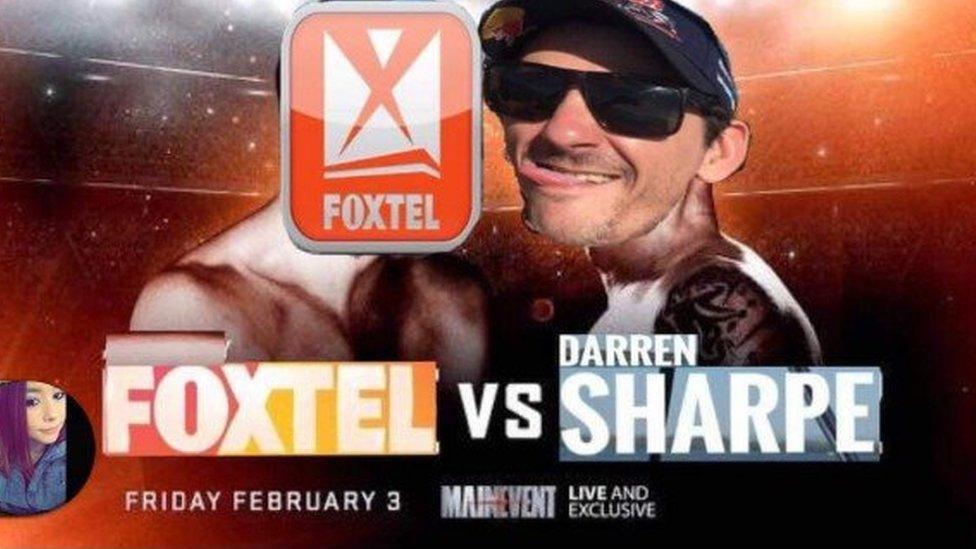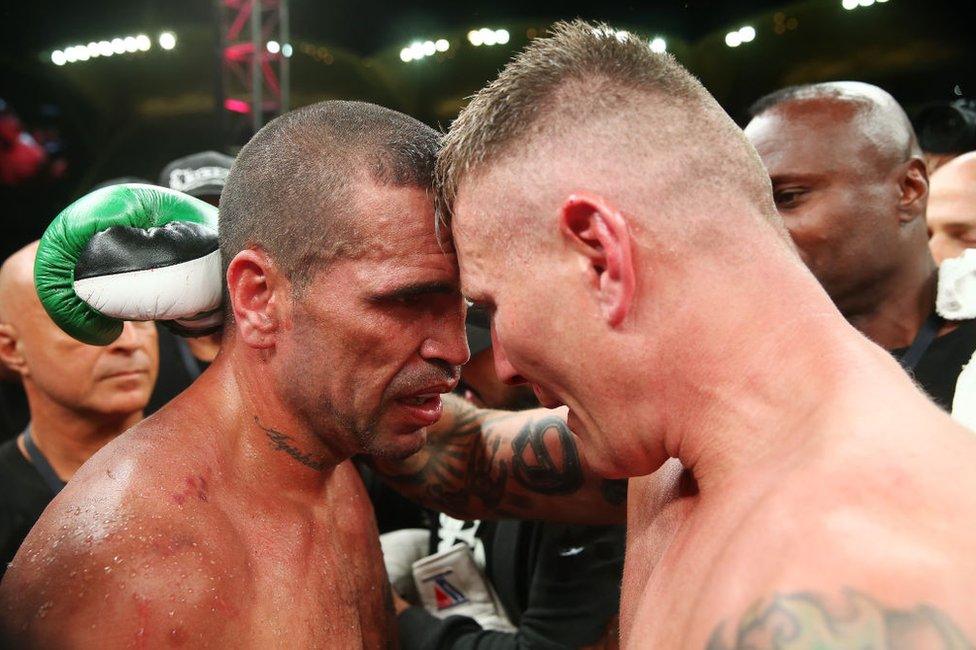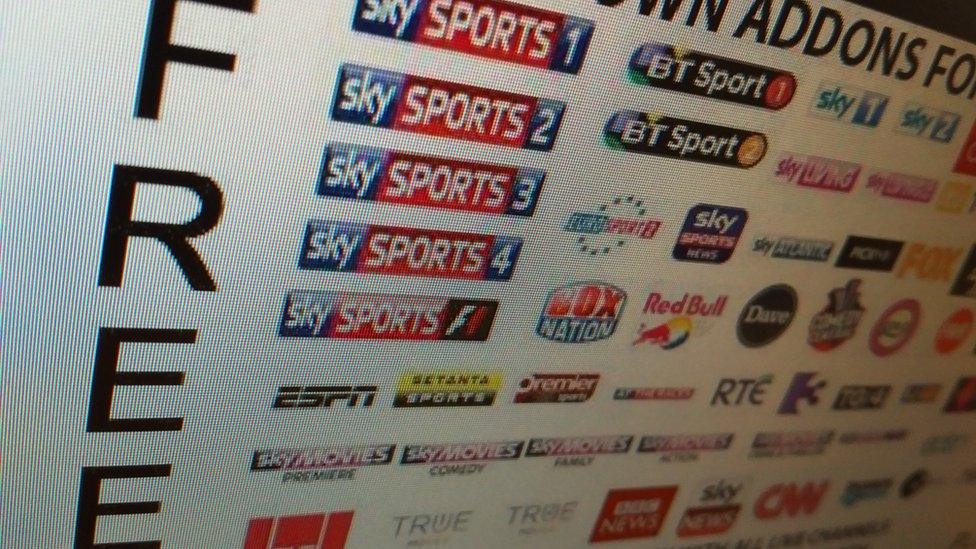The bruising clash over a Facebook Live stream
- Published

Danny Green took on Anthony Mundine in Adelaide
In the red corner: a mechanic who streamed Australia's most anticipated boxing match for free on Facebook Live. In the blue corner: a cable TV company that risked a public backlash to protect its lucrative broadcast rights.
It's a skirmish that has sparked intriguing debate in Australia this week, raising questions about whether individuals - and social media companies - should be held accountable for copyright infringement.
What's this all about?
A boxing match between high-profile Australian boxers Anthony Mundine and Danny Green took place last Friday, a final chapter in their long-running rivalry.
Cable TV rights-holder Foxtel charged viewers almost A$60 (£37; $46) to watch it. But only 27% of Australians have access to cable TV and annual Foxtel subscriptions cost between A$600 and A$1800.
One fan, Darren Sharpe, took matters into his own hands. Using a function available to all Facebook users, he broadcast the fight from his phone to "a few friends who couldn't afford the event".
His Facebook Live stream was rapidly shared, and at one point more than 100,000 people were watching the feed.
It did not go unnoticed by Foxtel. A representative for the company phoned Mr Sharpe asking him to end his stream. The call was also broadcast live.
Mr Sharpe is heard saying: "I'm not doing anything wrong, mate. What can you do to me?"
The representative replies: "It's a criminal offence against the Copyright Act, mate. We've got technical protection methods inside the box so exactly this thing can't happen."

A parody image posted on Mr Sharpe's Facebook page
Mr Sharpe's actions earned him real-time internet status: memes, a hashtag (#RemotesOutForDazza) and an entry on slang website Urban Dictionary ("Doin a Dazza").
Foxtel quickly threatened him with legal action. Mr Sharpe then started a fundraising page for a possible defence, drawing some donations.
What happened next?
"The incident with Facebook last weekend is not just theft," Foxtel chief executive Peter Tonagh told News Corp, external. "It is a threat to the future viability of live events such as boxing and to the sustainability of the content industry generally."
Industry commentators queried the company's hard line. Tim Burrowes, on industry website Mumbrella, external, wrote: "The Australian public like a Robin Hood figure, and taking extreme legal action - which the company has threatened - will turn Sharpe and his compadres into exactly that."
David Lipson said consumers demanded instant access. "If it's not easy to buy, and relatively cheap, technology allows them to go elsewhere," he wrote for the Australian Broadcasting Corp, external.
Days later, Foxtel said it would "educate" Mr Sharpe about copyright, rather than take legal action. It coincided with an apology by Mr Sharpe on his Facebook page.
"I know that this was illegal and the wrong thing to do," he wrote on Thursday. "Foxtel and the event promoters invested hundreds of thousands of dollars to produce the fight and to broadcast it."
What is Facebook doing to prevent illegal streams?
The social network has human moderators who monitor streams but only after videos reach an undisclosed audience threshold.
It also has a Rights Manager, external page allowing copyright holders to request the removal of material.
Facebook did not respond to a request for comment, but in a blog post, external last year it claimed to have taken steps to protect live broadcasts.
"We check every Facebook Live video stream against files in the Rights Manager reference library, and if a match surfaces, we'll interrupt that live video," it said.
What does the law say?
Under Australian law, external, serious copyright infringements can attract fines of up to A$117,000 or five years in jail.
In the US, "safe harbour" provisions offer protection to companies - such as Facebook - from copyright infringements made by third parties.

The Mundine and Green clash ended after 30 minutes
However, Fiona Phillips, chief executive of the Australian Copyright Council, said it was not the same in Australia.
"It only applies to ISPs (internet service providers) not to other service providers, so it doesn't apply to Google, Twitter, Facebook, etc," she told the BBC.
Will rights holders change their approach?
Twitter's live-streaming app Periscope has also hosted unsanctioned broadcasts.
But in an Australian first, the company last year secured official rights to stream Australia's Melbourne Cup horse race. It has also signed a deal to stream NFL matches in the US.
Experts believe it may be a sign of things to come. Professor Nigel Phair, from the University of Canberra, points to similarities with piracy in the music industry.
"iTunes made their songs cheap enough that people stopped trying to bootleg music, because you could buy songs for 99 cents each," he said.
Is the pay-per-view model broken?
Live sporting broadcasts are a key reason many people subscribe to cable or satellite television.
Netflix has said it is not interested in buying rights from established leagues. However, Amazon is reportedly interested in sports, external including tennis, rugby, football and car racing.
Dr Matthew Rimmer, from Queensland University of Technology, said internet companies had a fundamentally different approach.
"TV companies still try to divide programmes in terms of different geographical markets and timeslots," the intellectual property law expert told the BBC.
"By contrast, a lot of the internet services can globally distribute an event widely and break down those old geographic and temporal limitations."
Mr Sharpe did not respond to requests for comment.
- Published29 September 2016
